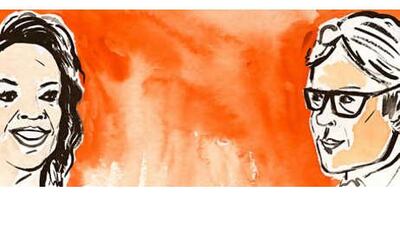Some viewed it as a case of misrepresentation, others a bitter public feud. Either way the mutual mistrust that has long simmered between Jonathan Franzen, the great American novelist of the day, and Oprah Winfrey, the queen of daytime television, had shown little sign of cooling down until the pot suddenly stopped boiling a few days ago - nine whole years after it first started bubbling away. Franzen, you will recall, wrote The Corrections, his novel of family conflicts, at the beginning of the last decade.
The title was later picked by Winfrey as a selection for her book club, which in 2001, at the height of its powers, was able to transform undiscovered titles into bestsellers. The choice was meant to give a significant leg-up to a novelist whose career was only just taking off. Franzen is, though, as we now know, as awkward in the limelight, as he is erudite within the pages of his fiction. When he expressed some mild discomfort at the prospect of a big-ticket book club sticker adorning the jacket of his novel, his comments were widely interpreted as some kind of fightback against the brutishness of big business.
Retaliating to this perceived slight, Winfrey hastily withdrew her favours, although oddly The Corrections is, to this day, still listed as one of her club's choices for 2001. In truth, the affair did neither side much good: Franzen appeared ungrateful, Oprah spiteful, a trait the world's tabloid press is always happy to play up, regaling readers with regular recaps of her long-running celebrity disagreements.
Over the intervening years, the incident has been transformed into a dispute in which outside perspectives have been permanently warped. The further away we all travel from that first edition of The Corrections, the longer the shadow its perceived greatness has cast. Franzen has appeared muted, burdened by expectation ever since (luckily, he does discomfort very well), or at least until the release of Freedom last month. Meanwhile Oprah has lost interest in her book club, making progressively fewer picks with each passing year, studiously avoiding new releases. Some might even conclude that the rejection left her wounded, unwilling to take many more forays into the lofty world of literature.
In truth, Oprah's faltering attention has more to do with the rise of her other business interests, most notably, her rudely healthy publishing empire. All of this makes the recent thaw in Franzen-Winfrey relations more delicious to watch, like a couple tentatively renewing their vows after a long separation. Franzen made the running, indicating that he would be delighted if Freedom became a book club pick, then Oprah described the author in glowing terms, making it her first, and probably, final book choice of the year, possibly her last ever.
In conducting such a public courtship, both Winfrey and Franzen have shown that they possess the admirable ability to move on, to free themselves from the errors of the past and, perhaps most crucially, a keen sense of commercial reality. Franzen's acceptance of the hand that feeds him strips away the impression of his aloofness - he famously prefers twitching to Twitter - and will deliver a huge pile of new orders to add to the already impressive numbers stacking up behind his latest work: a reported 600,000 copies have been ordered by the book club, close to double the already big-number, first-edition run.
Winfrey meanwhile gets to close her book club - as appears likely when she moves her show exclusively to subscription TV in the new year - having flexed her unquestionable commercial muscle once more, in the process putting to bed a long-running spat. It is a perfect exit strategy for both parties. The titles of the two novels that bookend this process - The Corrections and Freedom - seem more appropriate now than ever.


